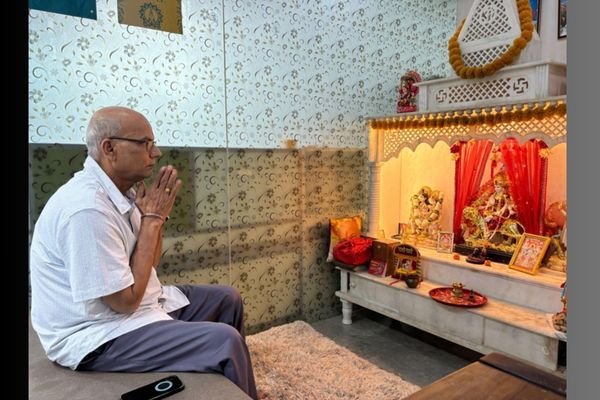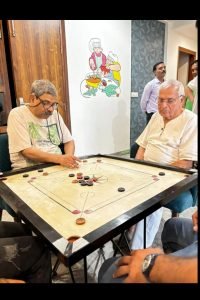Updated: 07-10-2025
The Changing Face of Elderly Care in India: Trends that Families must know
India is at a crossroads in its population development.
The country has been defined by a youthful population for decades, but there is a silent but significant change: India is fast turning into an older nation.
People above 60 years will increase from 157 million to 346 million by 2050. Rising lifespan and healthcare improvements have led to an acute and groundbreaking need for quality Elderly care in India.
The Indian system of extended Family care for seniors is struggling to adapt.

Families are realising they must plan not only emotional and physical needs but also logistical, financial and technological changes transforming senior homes and care.
Demographic/Social Changes that are becoming forces of change
Increased Elderly population and life expectancy
Improvements in healthcare, sanitation, and nutrition have increased life expectancy, so seniors are living longer and with chronic conditions.
This complexity requires professional interventions, motivating the need for long-term care solutions.
Joint Family to Nuclear Living & Migration
The disintegration of joint families into nuclear units and the migration of young professionals leave many parents without daily caregivers.
This vacuum is being filled by Home healthcare for the elderly services and institutional care. The financial power of NRIs to afford trustworthy care for parents drives the premium segment.
Social and Cultural Effects on Ageing
Traditionally, admitting a parent to a Retirement home in India was stigmatised. This cultural resistance is now diminishing in urban and educated demographics.
Contemporary seniors value independence, social interaction and convenience. They view senior living as a lifestyle offering security, amenities, and wellness programs.
Traditional/Modern Models of Elderly Care
Past Family-Centric Care
Family care was emotionally comforting and free, but it often led to caregiver burnout, lacked medical expertise, and limited career opportunities.
Though family support remains crucial, the model is no longer sustainable as the only pillar.

Indian Rise of Retirement Homes and Assisted Living
Managed senior living now includes:
Retirement homes in India:
Independent living communities offering security, socialisation, and maintenance-free living for active seniors.
Assisted living in India:
For seniors needing help with ADLs like bathing, dressing and medication but not 24-hour nursing.
By 2030, the senior living market is expected to reach millions of households due to professional and institutional investment.
Home Healthcare and Hybrids
Most seniors prefer ageing in place, fueling Home healthcare growth. Services range from domestic assistance to professional nursing, physiotherapy and post-hospital recovery.
Hybrid models—mixing professional and family caregiving—are becoming common, supported by tech-enabled service aggregators.
Major Trends and Advocacies in Ageing
Age-Friendly Infrastructure & Housing
Developers now design age-friendly environments with ramps, grab rails, emergency call buttons and geriatric clinics.
Specialised dementia and memory care facilities are increasing, and policy support for public age-friendly spaces is growing.
Technology in Elder Care
ElderTech is transforming care through:
Telemedicine & Remote Monitoring: Wearables track vitals and alert caregivers.
- AI & IoT: Devices detect falls and monitor medication compliance.
- Digital Platforms: Apps let families and NRIs organise and pay for services remotely.
Safety, Security & Elder Protection
With rising elderly abuse and fraud, background-checked caregivers, legal and financial planning, and 24/7 monitored facilities are growing. Senior living homes hold an edge with manned and monitored security systems.
Individual and Holistic Care Plans
Modern services focus on person-centred care addressing physical, psychological, social and spiritual needs. Multidisciplinary teams include nurses, counsellors, dieticians and physiotherapists.
Preventive Healthcare/Wellness Emphasis
Focus is shifting from illness management to wellness—yoga, fitness, socialisation, screening, immunisation and nutrition—to increase health span over lifespan.
Elderly Care Problems and Difficulties
Affordability/ Cost Issues
One of the major hurdles for most people is the high cost of senior living in india.
Although the premium Assisted living in India is comparatively less expensive than Western countries (usually half the price), it is still out of reach of lower and middle-income families, particularly since many seniors are surviving on small pensions or limited savings.
Shortage of Trained Caregivers
There is a severe shortage of qualified caregivers. Investment in geriatric nursing, physiotherapy, and home care training is essential to sustain service quality.
Emotional Cultural Resistance
Families often delay long-term care decisions until a crisis occurs. Seniors may resist leaving their homes due to emotional attachment and fear of change.
Regulatory & Trust Issues
The sector remains fragmented and under-regulated. A clear regulatory framework is needed to ensure quality standards and build trust between families and private service providers.
What to Take into Account in Planning Elder Care by the Family
Making Care Choices
Depending on health, finances, and preferences, families must assess needs:
- Home healthcare for the elderly: For moderate needs with independence.
- Retirement homes: For active seniors desiring community and security.
- Assisted living: For those needing daily support with privacy.
Safety & Home Modifications
Ensure anti-skid floors, good lighting, grab bars, and emergency contacts. For home care, background verification of caregivers is essential.
Financial & Legal Planning
Families should plan for long-term care insurance, review savings, and secure wills, power of attorney, and advance directives to ensure the senior’s wishes are honoured.
Emotional & Social Well-Being
Combat isolation and depression through socialisation, hobbies and intergenerational engagement. Dignity and independence should guide all care decisions.
Future of aged care in India
The Future of senior care in India is moving toward a digital, decentralised and specialised ecosystem. By 2030, quality and service delivery will be standardised in metros. Emerging trends include:
- Integrated Care Networks: Seamless coordination between home care, assisted living and hospitals.
- Subscription-Based Models: Flexible, affordable plans.
- More Geriatric Specialisation: Increased training and staffing.
- Public-Private Collaborations: Government and private developers creating affordable senior housing.
Conclusion
The evolution from informal Family care to a specialised, technology-driven industry is transforming Elderly care in India.
Families must plan early, budget realistically, and communicate openly about care preferences.
Recognising that professional support complements, not replaces, family love will ensure seniors live with dignity, independence, and a higher quality of life.
Also Read :
How To Stay Healthy At Old Age?
Essential Items for Diabetes Management: Build Your Care Kit

